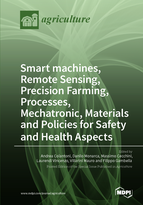Smart machines, Remote Sensing, Precision Farming, Processes, Mechatronic, Materials and Policies for Safety and Health Aspects
A special issue of Agriculture (ISSN 2077-0472).
Deadline for manuscript submissions: closed (20 October 2017) | Viewed by 145604
Special Issue Editors
Interests: energy; environment; agriculture
Special Issues, Collections and Topics in MDPI journals
Interests: renewable energies; forestry and agricultural mechanization; safety and health in agriculture; processing plants and food quality
Special Issues, Collections and Topics in MDPI journals
Interests: agricultural machinery; occupational safety and health; ergonomics; agriculture; energy
Special Issues, Collections and Topics in MDPI journals
Interests: agricultural mechanics and mechanization; safety and health
Interests: energy; environment; agriculture
Special Issues, Collections and Topics in MDPI journals
Interests: agricultural mechanization; energy; IoT; precision farming and machine learning
Special Issues, Collections and Topics in MDPI journals
Special Issue Information
Dear Colleagues,
The introduction of "smart machines" for agricultural operations will allow several advantages, such as an increase in their efficiencies, a reduction in environmental impacts and a reduction of work injuries. There are partially- and fully-automatic devices for most aspects of agricultural functions, from seeding and planting to harvesting, from spraying to livestock management, and so on. Moreover "precision farming", using sensors and robotic technologies are applied to existing systems. Work health and safety are also linked to the use of modern technologies, e.g., the protection of machinery operators from crush, entanglement, and shearing by means of mechatronic solutions. Another aspect is the use of robots and smart automation, which can also benefit from the gathering of operational data, such as machine condition and fleet monitoring, allowing preventive maintenance and improved fleet management. Considerable advances in sensing hardware, information technologies, smart systems, and software algorithms, have led to significant new developments in the areas of equipment health monitoring, fault diagnosis, and prognosis. These advances enable industries to undergo a fundamental shift towards condition-based maintenance to improve equipment availability and readiness at reduced operating costs throughout the system life-cycle. The emergence of sensor networks is also bringing the possibility of collective learning algorithms and decision-theoretic approaches to facilitate effective and scalable diagnostic/prognostic technology for widespread deployment of condition-based maintenance. The mentioned technological development is applicable to the relevant context of safety engineering. Furthermore, energy, safety and agriculture have an important role in reducing environmental emissions. All the systems aimed at the management of energy, safety, and environment are performed and optimized by means of innovative technologies, materials, processes, and methods.
The purpose of this Special Issue is to publish high-quality research papers, as well as review articles, addressing recent advances on systems, processes, and materials for work safety, health, and environment. Original, high-quality contributions that have not yet been published, or that are not currently under review by other journals or peer-reviewed conferences, are sought.
Potential topics include, but are not limited to:
Materials
- Study of man–machine dialogue systems.
- Analysis on towed or carried machines: Forestry chippers, manure spreaders, round balers and others.
- Safety and Health management system design and engineering.
- Safety and Health monitoring sensors and sensing.
- Data-driven methods for anomaly detection, diagnosis and prognosis.
- Precision farming
- Mechatronic
Processes
- Innovative methods.
- Systems integration.
- Automotive and agriculture machinery applications.
- Agricultural automation.
- Precision farming machinery.
- Sensors.
- Condition monitoring.
- Material and methods on Precision Farming.
Systems
- Engineering and optimization.
- System engineering concepts.
- Engineering of hybrid and integrated systems and their efficiency maximization, especially for safety and health purposes, aimed to injuries and accidents reduction.
- Use of remote sensor and mechatronic systems applied in several aspects.
Dr. Andrea Colantoni
Dr. Monarca Danilo
Dr. Cecchini Massimo
Dr. Laurendi Vincenzo
Dr. Villarini Mauro
Dr. Filippo Gambella
Guest Editors
Manuscript Submission Information
Manuscripts should be submitted online at www.mdpi.com by registering and logging in to this website. Once you are registered, click here to go to the submission form. Manuscripts can be submitted until the deadline. All submissions that pass pre-check are peer-reviewed. Accepted papers will be published continuously in the journal (as soon as accepted) and will be listed together on the special issue website. Research articles, review articles as well as short communications are invited. For planned papers, a title and short abstract (about 100 words) can be sent to the Editorial Office for announcement on this website.
Submitted manuscripts should not have been published previously, nor be under consideration for publication elsewhere (except conference proceedings papers). All manuscripts are thoroughly refereed through a single-blind peer-review process. A guide for authors and other relevant information for submission of manuscripts is available on the Instructions for Authors page. Agriculture is an international peer-reviewed open access semimonthly journal published by MDPI.
Please visit the Instructions for Authors page before submitting a manuscript. The Article Processing Charge (APC) for publication in this open access journal is 2600 CHF (Swiss Francs). Submitted papers should be well formatted and use good English. Authors may use MDPI's English editing service prior to publication or during author revisions.
Keywords
- Agriculture Engineering
- Mechatronic
- Sensors
- Safety Engineering
- Fire and Building Safety
- Precision farming
Benefits of Publishing in a Special Issue
- Ease of navigation: Grouping papers by topic helps scholars navigate broad scope journals more efficiently.
- Greater discoverability: Special Issues support the reach and impact of scientific research. Articles in Special Issues are more discoverable and cited more frequently.
- Expansion of research network: Special Issues facilitate connections among authors, fostering scientific collaborations.
- External promotion: Articles in Special Issues are often promoted through the journal's social media, increasing their visibility.
- Reprint: MDPI Books provides the opportunity to republish successful Special Issues in book format, both online and in print.
Further information on MDPI's Special Issue policies can be found here.











